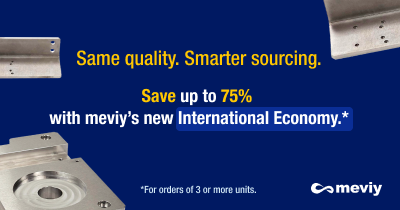BLOG » New at meviy: New Plastic Materials for CNC Milled Parts
New at meviy: New Plastic Materials for CNC Milled Parts
When it comes to CNC milling, material choice is as crucial as precision. The right material can elevate your design by meeting specific functional, aesthetic, and performance requirements. That’s why we’re excited to introduce four new plastic materials for CNC-milled parts: MC Nylon (Conductivity, black), PP (Standard, white), PPS (Standard, natural color), and PET (glass-filled, brown).
Each of these materials brings unique properties to the table, offering enhanced options for applications across industries like electronics, automotive, and manufacturing. Whether you need electrical conductivity, chemical resistance, or exceptional mechanical strength, our new plastic lineup is here to meet your needs. Let’s take a closer look at what makes each material stand out.
| Property | Value |
|---|---|
| External Dimensions | ±0.05 or more |
| Dimensional Tolerance | ±0.02 or more |
| *Plastic is ±0.05 or more | |
| Precision Hole Tolerance | IT Level 7 or above |
| Precision Hole Roughness | Ra1.6 |
| Slot Width Tolerance | IT Level 7 or above |
| Slot Width Roughness | Ra1.6 |
| Material | Density [g/cm³] | Tensile Strength [MPa] | Flexural Modulus [MPa] | Coefficient of Thermal Expansion [10⁻⁵ K⁻¹] | Volume Resistivity [Ω・m] |
|---|---|---|---|---|---|
| MC Nylon (conductive, black) | 1.20 | 69 | 4210 | 8.0 | 1-10² |
| PP (standard, white) | 0.91 | 34 | 1400 | 11.1 | 10¹³ |
| PET (glass-filled, brown) | 1.63 | 110 (vertical) / 65 (horizontal) | 11000 (vertical) / 7000 (horizontal) | 4.0 (vertical) / 7.4 (horizontal) | 10¹³ |
| PPS (standard, natural color) | 1.35 | 79 | 3300 | 2.4 to 2.9 | 10¹⁶ |
What is MC Nylon (Conductivity, Black)
Designed for applications requiring electrical conductivity and wear resistance, MC Nylon stands out as a versatile material. Its black color provides UV resistance, making it ideal for outdoor or high-exposure environments. With excellent machinability and low friction, it’s perfect for components like bushings, rollers, and insulators in demanding industrial settings.

What is PP (Standard, White)
Polypropylene (PP) is a go-to choice for applications needing chemical resistance and low density. Its standard white finish makes it aesthetically clean and practical for industries like food processing, medical, and packaging. PP offers excellent moisture resistance and flexibility, making it a reliable material for lightweight parts where durability and safety matter.

What is PPS (Standard, Natural Color)
PPS (Polyphenylene Sulfide) is a high-performance thermoplastic known for its superior chemical resistance and thermal stability. In its natural color, this material is ideal for parts exposed to harsh conditions, such as automotive components, chemical processing equipment, or electronics. PPS maintains its strength and stiffness even under extreme temperatures, ensuring long-lasting reliability.

What is PET (Glass-Filled, Brown)
Glass-filled PET offers a unique combination of mechanical strength and dimensional stability. Its brown finish signals its rugged durability, making it a top choice for structural components and precision parts. Ideal for high-load applications, this material excels in industries like aerospace, automotive, and machinery, where both performance and reliability are non-negotiable.

Conclusion
As industries evolve, so do the demands placed on materials used in CNC milling. With the introduction of MC Nylon (Conductivity, Black), PP (Standard, White), PPS (Standard, Natural Colour), and PET (Glass-Filled, Brown), we are offering solutions that meet a wide range of functional and performance requirements.
From the electrical conductivity of MC Nylon to the lightweight chemical resistance of PP, the thermal stability of PPS, and the strength of glass-filled PET, these materials provide diverse options tailored to modern engineering challenges.
Choosing the right material is essential to ensure the success of your projects. By expanding our material selection, we’re empowering you to innovate with confidence, whether your focus is on durability, precision, or high-performance applications.
Explore these new options and unlock the potential of your CNC-milled parts. With these advanced materials at your disposal, the possibilities are endless.
 Deutsch
Deutsch Français
Français Español
Español Italiano
Italiano Polski
Polski